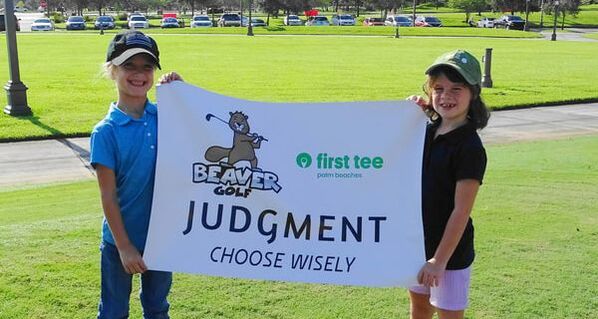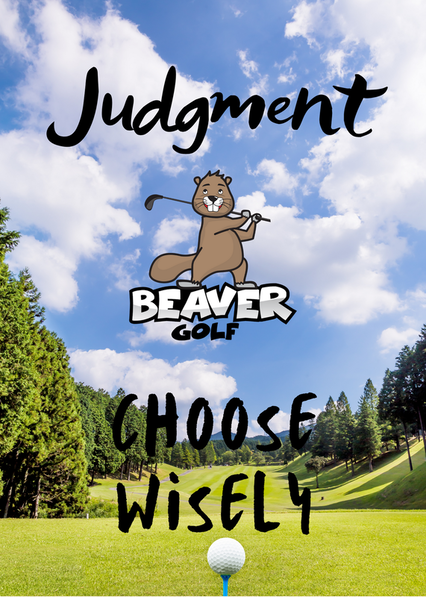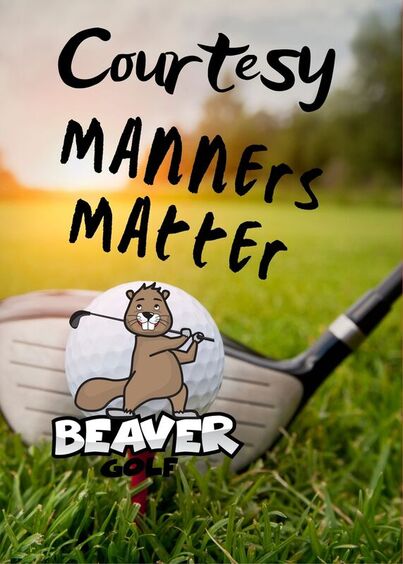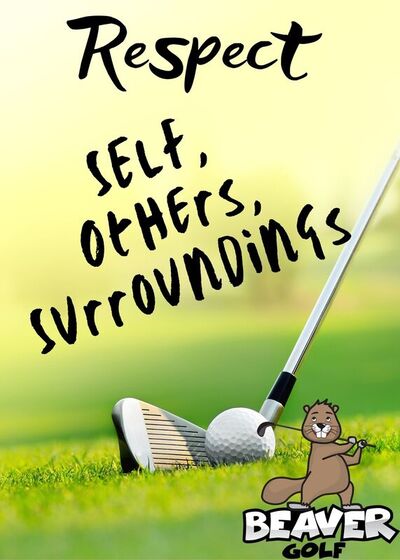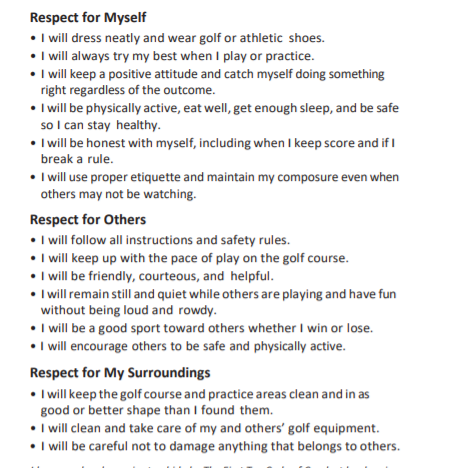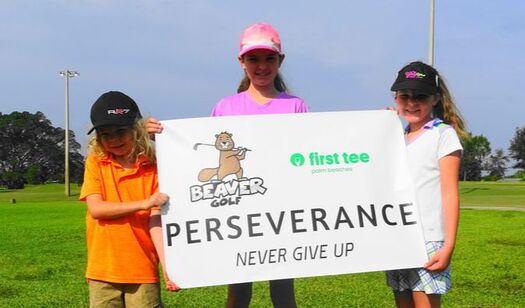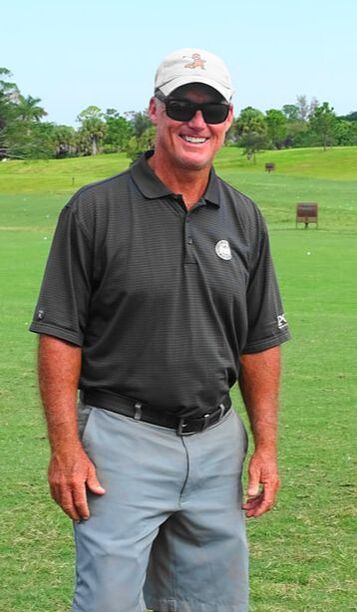|
If you really want to play golf you need to develop some mental toughness. When I play, I often talk to myself as I prepare to hit a shot and I can be really hard on myself when I shot does not go the way I visualized it in my head. You will not see me pound my club or throw a club in the water after a poor round. Throwing your clubs in the water or on ground is a bad judgment call because if those clubs are damaged or cannot be retrieved, they are no longer available to you during the round. Why would anyone deliberately handicap themselves? Unfortunately, a lack of mental toughness often leads to judgment calls that are emotionally led. I mentioned that I talk to myself when I play. This is not uncommon, PGA Tour players are often caught on the mic offering feedback to themselves after seeing the outcome of their swing. We make judgment calls when we choose the words that we use to critique ourselves. One player chose to use a word that was deemed offensive by his sponsor and he was dropped within twenty-four hours. That's a very costly judgment call. I say it in the golf swing but it applies to our decisions too. Every action has a reaction! The 2024 PGA Championship showcased several decisions that were made by players and tour officials. In this article, you will get a glimpse into some of the decisons that LPGA players need to make: Decision: When to start a professional career? In golf and in life we have to make choices. When evaluating your choices, it is important to consider all of the possible outcomes of those choices. This is where judgment enters the picture. On the golf course, you have to make the call about club selection, target selection and tempo to name a few . The more you play the more you develop information about your abilities and how to approach the shot or putt at hand. While the goal is simple, get the ball in hole in the least amount of strokes, the strategy to accomplish that goal requires you to be clear of mind so you can apply judgment before making a decision. In order to choose the right club, you need to know your distances. confidence: the feeling or belief that one can rely on someone or something; firm trust. updated 5/1/2024 The best way to gain confidence on the golf course is to play. Over the years, I have had adults and juniors come to me week after week to learn the golf swing but they never get out to play. It is easy to become a master on the range when you are practicing and applying everything that you have learned but playing the course is a completely different animal. If you mess up on the range or while practicing your short game, you can always try again with a different ball. When you are on the course, the stroke counts. When you are on the course, it is easy to get frustrated. When you are on the golf course, your ball could end up in the water, in the trees, on a hill, in the bunker, near a bush, near a tree...you need to be ready to play the ball. While a lot of things can go wrong when you play, a lot of things can go really well. You can make a par or even a birdie. You may hit the straightest drive of your life or chip-in. You might see a racoon with her babies, you might see a rabbit hop by your cart, you will probably see a gator and other common wildlife. If nothing else, take in the beauty of playing golf in the fresh air on a beautiful course. Just go play and build your confidence!! When I teach beginner golf students, the most common feedback I hear is "this is harder than it looks." While this may be true, by the end of the first lesson, they leave with more confidence in their ability to learn and eventually play the game. I fully believe when you have experienced some level of success you will be motivated to get to the next level. It is my goal to help all of my students get to the next level and become more confident in their abilities. I also believe confidence is a state of mind. If you think you can, you will, if you think you can't, you won't. I ran a very successful contracting business in Chicago prior to moving to FL because I was confident in my abilities to deliver what my clients needed. When my kids graduated from high school, I decided to become a golf teaching pro because I was confident in my love for the game and I wanted to help develop that in others. Today, I am humbled by that confidence as I see my students progress. After some quiet years on the PGA Tour, Tony Finau is making some noise. He has never waivered in his confidence, he remained patient with his game and things are starting to come together for him.
I've always felt like I've been very mentally strong. Sometimes I feel like once my game matches up to my mental attitude, I feel like I can be a great player. I feel like I've been a good player, showed some brilliance in spurts, but being consistent, to be consistently great takes a full game both mental and physical, and I feel like, honestly, my physical game is starting to match up to my mental. I've always been tough, I've always been strong mentally. Having a game that matches that is, I think, a great combination and I'm starting to see that with myself. Confidence is developed through practice! Scottie Scheffler is a perfect example of what I meant when I originally posted about how to develop confidence. Last year, he was invited to player on the Ryder Cup team, a decision that was considered to be controversial since he had never won on the PGA Tour. Scheffler was a huge factor in Team USA's win over Europe 19-9. This year Scheffler has built on that momentum by winning four out of his last six tournaments including The Masters and he is ranked #1 in the world. He is grinding it out one round at a time and has remained extremely humble through the experience. Personally, I like that he is continuing to learn and improve his game every time he plays. He also has surrounded himself with a strong support system in his family and faith. Apparently Reader's Digest is still around and earlier this year an article was published about the sixteen habits that polite people have in common, they are listed below:
As I think about the culture that we live in today, it seems that we are starting to forget some of the basics of being courteous to one another. What do you think? In golf, the person who had the best score on the previous hole is extended "honor" which means they tee off first on the next hole. This is just one way that golfers extend courtesy to one another. Another important way of extending courtesy is being mindful of time. This starts with arriving at least ten minutes before your scheduled tee time and continues through the round by maintaining the appropriate pace of play for each hole. Being mindful of time should extend outside of the golf course as well. This means showing up five to ten minutes before a scheduled appointment. If you are running late for an appointment it is courteous to notify the person you were scheduled to meet so they can plan accordingly. Amazingly, these two simple ways of extending courtesy are often neglected but they don't have to be forgotten. The core value of courtesy is a building block for sportsmanship. In other words, you are incapable of displaying sportsmanship without courtesy which is defined as 'the showing of politeness in one's attitude and behavior toward others'. This is especially important in life which is why I am very supportive of parents who cancel lessons when their junior golfer has not been courteous to them. I will also do what I can in the following lesson to encourage better choices at home. As you watch this video you may find that being courteous on the golf course is very similar to being courteous at home and in every day life. This is a classic filled with great reminders about being courteous. Respect your elders. As an older golf coach with a Peter Pan mentality, I always appreciate meeting golfers who are respectful. I am especially impressed by the junior golfers and millenials who call me "sir." While this is not necessary, "Coach Glen" will do, it definitely makes an impression because it is not so common anymore. When I teach group classes, I am always impressed by the golfers who pay attention when I speak and raise their hand when they have something to add or have a question to ask. These simple skills show restraint and respect for the authority that is speaking. When overlooked in the younger years, the result is an adult who pays for a lesson with a golf teaching professional only to contradict what the professional was hired to teach. Yes, this happens. Call me Coach Glen. I do not appreciate being addressed as "bro." I have brothers and we never use that terminology with each other. Code of ConductNelly Korda has been making decisions that shows she has respect for herself. David Skinns showed respect for others during his opening round at the Cognizant. Respect begins with how you feel about yourself. If you do not respect yourself, it is very unlikely that you will respect others never mind the environment that you occupy. The Village of Royal Palm Beach opened the Golf Learning Center in Commons Park to offer a service to its residents and any other people who might like a quiet place to practice their golf skills. I have the honor of teaching there almost daily and it is incredibly disappointing to see how some people treat the facility. The following are some friendly reminders that can be applied at all practice facilities: 1. Purchase golf balls at the machine. Never collect balls on the range for your personal use. Not only is this theft, but it is a safety hazard. While you are collecting balls you are preventing others from practicing because they be afraid of hitting you. 2. The balls belong to the facility. Taking practice balls home is stealing. If you have extra balls pass them on to another golfer on the range. 3. When using the balls to practice short game or approach skills do not leave them behind. Always collect them, use them on the driving range or offer them to another golfer. 4. The putting greens are for putting only. No other clubs should used on the putting green. You should never attempt to take a full swing on the putting green. Divots are very costly to repair. 5. Do not enter any area that is roped off. The ropes indicate an area that is under repair or needs time for the seed to grow. Without respect, we can not appreciate. When appreciation is lacking, selfishness thrives. Respect yourself and follow safety guidelines!! This video may be goofy but it covers some important safety reminders. Lightning is no joke, know what to do. updated 5/8/24 Most beginner golfers think the sport has to be easy to learn because it looks easy. You hit the ball and get it into the hole, how hard can it be? The idea of the game is easy but the technique and discipline behind the game can be difficult to grasp. Many focus on the full swing, specifically the tee shot with the driver because they want to see how far the ball will travel. Smart golfers think about the second and third shots. They think about lay ups, bails outs and even stingers. Around the greens you learn how to bump and run or use a flop shot to your advantage. If these terms are sounding foreign to you, then you are missing out on the rich levels of diversity the game of golf offers when you play. Golf will stretch your imagination if you let it. It will allow you opportunities to think about angles and geometry in a way you never thought you would. What might be an obstacle for one player can actually be a help to another because of their ability to adapt to situations. The more you play, the more you will learn about your ability to think creatively and overcome while working towards your next best score on the course. Persevere through physical challengesGrowing up I played several sports including football and I was considered an elite athlete because I put in the effort on and off the field. I dedicated a lot of time to physical training in the gym building strength. It was very rewarding to attain strength goals so I decided to push myself even more by becoming a competitive power-lifter. This pursuit caused a lot of wear and tear on my shoulders that materialized when I decided to become a golf professional. The more I played the more pain I experienced but I was not willing to let the past influence my future. I did as much as I could with home remedies until I met a personal trainer that had experience with my injury. She developed a program of exercises and therapies that allowed me to gain a better range of motion. It has been nearly five years and I am finally starting to play good golf. Recently, I have been plagued with some hip issues that are pretty common for golfers and if I don't warm up well I can experience back pain for days. My trainer has moved on to some bigger endeavors so I have had to take control of my exercise routine. It is a commitment that means doing what it takes so I can play this game that I love. PERSEVERE THROUGH Mental CHALLENGESPERSEVERE THROUGH CircumstancesBack 2020, when the new management at the county golf courses decided that I was not a good fit for their programs, I did not know what was ahead. I knew I would be teaching somewhere. Initially that was in a park under the cover of trees. Seriously, I found a quiet shady spot with enough room for my net and some short game tools. It was the perfect spot to work with my junior students and they did not mind at all. As a matter of fact, they loved it. It wasn't a fancy golf course, but they were progressing and they continue to do so at the Golf Learning Center at Commons Park in Royal Palm Beach. I am sure that there are golf professionals out there that think less of me because I am not teaching at a golf course. I have also lost a few students since then because they want to learn in those facilities. I am fine with all of it because I love where I am, I love what I do, I love teaching. When you love what you do, you find a way to persevere. |
AuthorGlen Beaver Categories
All
|
